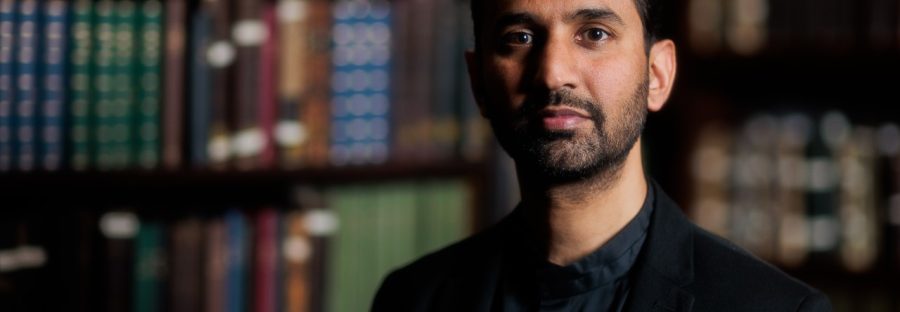Salaam festival shines a spotlight on Muslim culture in Manchester
- The five-day festival takes place in July
- Celebrates Islamic culture through art, poetry and music
- Insight from the Salaam creative director Rizwan Iqbal on the inner working of the festival and the current state of Islamic culutre
The Salaam Festival is a Manchester-based biennial festival that explores the future of Muslim art and culture through original work.
Its aim is to allow artists to be presented across disciplines and genres such as performing arts, visual arts, music and poetry.
Salaam, meaning the word welcome, brings together internationally-renowned artists from different art forms and backgrounds to create relevant, innovative, and progressive new work.
It is a landmark occasion for the multicultural city and challenges the way people engage and experience art.
The Salaam festival is supposed to be a nod to the future and a respectable bow to the past.
Rizwan Iqbal, festival artistic director, says maintaining a balance has sometimes been difficult.
“ I think there are certain things that you cannot comprise on, and I think we couldn’t create a Muslim arts and culture festival and be sponsored by an alcohol provider,” he said.
“Balance is the key, and I think the Islamic faith is originally about balance. It’s not doing anything in extreme and it’s not doing anything in low volumes.
“The balance for us is about doing the really simple things of making sure that we don’t step over the line.
“There are people out there who don’t agree with art or music within the Muslim culture and then there are those who don’t really practice, who do like to drink and go out and still call themselves Muslims.
“For us it’s about appreciating where everyone is right now but the message of what we’re bringing is your welcome to come and enjoy this.”
The project was born out of the pandemic with a series of conversations about the state of Muslim art and culture. Organisers received 44 bsubmissions from all over the world to take part in this year’s festival from both artists and ordinary people.
TICKETS ARE NOW LIVE!
We have a jam packed schedule from 20-25 July 2022, and our website has had a makeover! Visit our brand new website to book tickets and read all about our fantastic line-up!https://t.co/6XyWCchZV1@OneFellTweet @SalaamFestival #Salaamfestival pic.twitter.com/LK7A17R5k1
— Salaam Festival (@SalaamFestival) May 2, 2022
Rizwan said: “The original premises for this festival is to explore the future of Muslim art and culture.
“It’s evolving but there isn’t anything currently at scale that’s pushing the narrative forward, there isn’t enough positive news that’s representing Muslim-ness, which I feel is the platform and dialogue to instigate change.
“Visibility, promoting a lifestyle, food, music, visual art. These are tangible elements with being able to break down discourse and barriers. So first and foremost, this festival is about pushing Muslim art and culture. Secondly, it’s about audiences being able to experience something unique, assessable, and affordable.”
This year’s festival will debut five new commissions, including a brand-new composition based on poet Mohammed Iqbal’s work, an installation by Jameel Prize-nominated artist Sofia Karim and an immersive opening ceremony with award-winning chef Anissa Helou. It will also feature five nights of music at venues across the city centre, free programming in the ‘Medina’ – the festival hub, and a series of daily conversations called ‘Sohbet’.
Join us for a Sunday matinee performance at Albert Hall on July 24th at 2pm.
Experience the musicality, beauty and depth of thought of Mohammed Iqbal’s poem ‘Shikwa’ with dreamy vocals by Abi Sampa, delightful composition by Rushil Ranjan in collab with Manchester Camerata. pic.twitter.com/4qh8tMfMLF
— Salaam Festival (@SalaamFestival) May 21, 2022
Rizwan said: “Five original pieces of work were selected from artists and communities. We did a call-out in 2021 and basically shortlisted ideas that we thought could look for the July 2022 festival.
“They were shortlisted based on originality, scale, ambition and also the ability for that piece of work to be able to go on and reach other pieces of the world.
“For music, we looked at the different continents, who’s current, who’s established. We looked at the likes of Cat Stevens and then we really looked out to find the most ambitious artists who represent Muslim art and culture, both traditional and contemporary.”
Artists taking part include: Zaman, Faraz Ali, Abdul ‘Abdanger’ Kinyenya, Mohamed Koumenji, Rushil Ranjan, Eivand Aarset, Abi Sampa, Yusra Warsama, Manchester Camerata, Courtney Hayles, Nourredine Khourchid and the Whirling Dervishes of Damascus, Numbi Arts, Elmi Ali, Deba -The Women of Mayotte, Ajam Band, Elaha Soroor and Kefaya.
The festival will open with Mehfil, a feast for the senses. An estimated 500 people will be invited as guests to experience a gathering rooted in the festival’s exploration of Muslim arts and culture at Exchange Hall, Manchester Central
Other venues include Lincoln Square, Home, Albert Hall, Band on the Wall, Stoller Hall, Manchester Cathedral, Festival Hub and the Portico Library
The festival ends with the performance of a Grammy-nominated and Grammy award-winning artist on 25 July.
See the full programme


